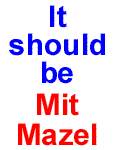A Retrospective Pesach
Last week, while preparing my Seder Plate, many fmilliar thoughts and memories came to me – much as they do each Pesach. I recall sitting at my father’s Seder table. I can see the memories flooding his thoughts as he reads aloud from the Haggada.
I wonder. Are they memories of Pesach past? A Seder night in Siberia during the war? How? Where did they get the Matzah? Who prepared the meal? Maybe there was no Matzah or any food at all to prepare. I want to ask these questions but I dare not.
He was a teenager then, a refugee from Poland enjoying the hospitality of the Soviet Union in the frozen wasteland of Siberia. His mother had died before the war leaving his father with three children to raise, and with Nazis threatening to invade Poland, they had crossed the border into Russia. His father was frail, a scholar by nature, but uncompromising; Pesach was a holy day and nothing would prevent him from observing its laws. Thus, while the world was at war with itself they sat at a table, the four of them, in that barren strange land and made a Seder.
This may in fact be the question of the wise son: "What are the laws, commandments, and statutes that G-d our G-d commanded you?" Unlike the wicked son this son is not excluding himself when he says "commanded you". He is marveling at his father's generation and wants to know what made them so strong. He is asking, "What did you see in the Mitzvot that made them non-negotiable?" “How did we lose that conviction? Why are Mitzvot which we observe a matter of choice for us but not for you? You didn't need the mitzvah to appeal to you, inspire you. You didn't need to see some spiritual benefits derive from observing Torah. You needed no reason to do what must be done; what is right, good and holy.”
The answer given the wise son is, "We don't eat or drink after the Afikomen." The Matzah eaten at the end of the meal - the pieces that were hidden for the children to 'steal' - need not be enjoyed. After a full meal we have no appetite for that Matzah. We don't enjoy its taste. It's a Mitzva, so we eat it. Yet we don't eat or drink after the 'afikomen' allowing the taste of it to linger.
This represents a great form of divine service; A Mitzva is best observed for its own sake - G-d asked us to do it so we do.
How do we do the mitzvah? With pleasure! We let the 'taste' linger.
We celebrate our Jewish-ness and the feel of it.
Thus we have the best of both worlds. We choose to do the mitzvah knowing that no choice is necessary. We have the PLEASURE of SERVING.
Send Page To a Friend
I wonder. Are they memories of Pesach past? A Seder night in Siberia during the war? How? Where did they get the Matzah? Who prepared the meal? Maybe there was no Matzah or any food at all to prepare. I want to ask these questions but I dare not.
He was a teenager then, a refugee from Poland enjoying the hospitality of the Soviet Union in the frozen wasteland of Siberia. His mother had died before the war leaving his father with three children to raise, and with Nazis threatening to invade Poland, they had crossed the border into Russia. His father was frail, a scholar by nature, but uncompromising; Pesach was a holy day and nothing would prevent him from observing its laws. Thus, while the world was at war with itself they sat at a table, the four of them, in that barren strange land and made a Seder.
This may in fact be the question of the wise son: "What are the laws, commandments, and statutes that G-d our G-d commanded you?" Unlike the wicked son this son is not excluding himself when he says "commanded you". He is marveling at his father's generation and wants to know what made them so strong. He is asking, "What did you see in the Mitzvot that made them non-negotiable?" “How did we lose that conviction? Why are Mitzvot which we observe a matter of choice for us but not for you? You didn't need the mitzvah to appeal to you, inspire you. You didn't need to see some spiritual benefits derive from observing Torah. You needed no reason to do what must be done; what is right, good and holy.”
The answer given the wise son is, "We don't eat or drink after the Afikomen." The Matzah eaten at the end of the meal - the pieces that were hidden for the children to 'steal' - need not be enjoyed. After a full meal we have no appetite for that Matzah. We don't enjoy its taste. It's a Mitzva, so we eat it. Yet we don't eat or drink after the 'afikomen' allowing the taste of it to linger.
This represents a great form of divine service; A Mitzva is best observed for its own sake - G-d asked us to do it so we do.
How do we do the mitzvah? With pleasure! We let the 'taste' linger.
We celebrate our Jewish-ness and the feel of it.
Thus we have the best of both worlds. We choose to do the mitzvah knowing that no choice is necessary. We have the PLEASURE of SERVING.
Send Page To a Friend








4 Comments:
Dear Rabbi Friedman:
Something in this post about Pesach confused me. On many other occasions I think you've said that mitzvas done only because G d commanded them are lesser mitzvas. Here you are saying they are a great form of divine service. Could you explain more? Thank you!
cbc
Where is the Rabbi? Run out of steam?
No, no... he hasn't run out of steam. His pen ran out of ink!!
Actually, he'll be starting a new series of posts next week, G-d willing, begining with the Rebbe's Yahrzeit on the 3rd of Tammuz.
Stay tuned!
I miss hearing the Rabbi "live" since I've moved across country recently. It was great to listen to the audio recording here!!
Please make more recordings available here if possible.
Thanks so much.
Post a Comment
<< Home